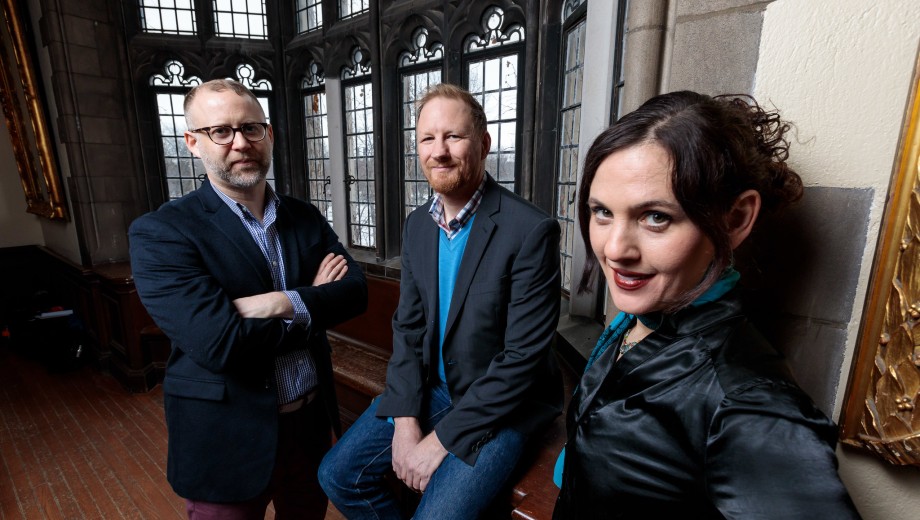Creative Writing became an undergraduate major during the 2017–18 academic year and quickly expanded beyond expectations: 100 majors as of February, with talk of an eventual graduate option.
Program chair John Wilkinson plans to add four full-time positions for 2019–20, joining a quartet of new faculty hired during the past two years: assistant professors of practice in the arts Will Boast; Rachel DeWoskin; Ling Ma, AB’05; and Augustus Rose.
All four have recently published novels. Boast’s Daphne (Norton/Liveright, 2018) is a modern retelling of the myth of Apollo and Daphne. DeWoskin has two books out this year: Someday We Will Fly (Viking Penguin) and Banshee (Dottir Press). Ma’s debut, Severance (Farrar, Straus, & Giroux, 2018), a dystopian workplace coming-of-age novel, earned the 2018 Kirkus Prize. Rose’s The Readymade Thief (Viking, 2017) is a speculative thriller about a teenage girl who stumbles into a mysterious secret society.
These newest additions to the Creative Writing faculty told Tableau about their favorite classes to teach, their next books, and what they’ve learned in and out of the classroom.
Notable courses
Faculty members lead standard workshop courses but also can develop their own classes according to their interests and passions, promoting what DeWoskin calls “a deep and sustaining conversation with each other and our students” about the craft of writing.
At the end of her class Constructing the Full-length Novel, students are expected to have a chapter breakdown and at least two written chapters. She also teaches a course on literary empathy, focused on imagining and evoking “experiences that are radically different from our own.”
One of Boast’s courses, Between What’s True and Truth, “looks at works that straddle the line between fiction and nonfiction in interesting ways,” including writing by John D’Agata, Katherine Boo, James Baldwin, and Kathryn Harrison.
“The lit world has asked, ‘What if we make our genre categories hazy?’” Boast says. “At the same time, our larger culture, and those in power, are also actively smudging the lines between truth and almost truth. Should writers, then, reinvest in our categories? Or is it more provocative to jettison them completely?”
Ma’s course Testimony examines first-person testimonial narratives, including those by Kafka, Patricia Lockwood, Richard Pryor, and William Maxwell. She’s also teaching an advanced workshop on alternative plot lines in short fiction, using works by writers including Anton Chekhov, Lucia Berlin, and Carmen Maria Machado.
Rose spent five years researching The Readymade Thief, which touches on, among other things, Marcel Duchamp, unified field theory, and urban exploration. Out of that experience he developed a course on research and world building, a term often used in science fiction and fantasy but equally applicable to making convincing worlds in realistic fiction.
Lessons learned and taught
Rose started out as a film student, and when he switched from writing screenplays to fiction, people described his writing as cinematic—which he only later realized was not always a positive.
“If you’re writing just cinematically, in a way that a reader can see everything, that’s fine,” Rose says, “but you’re not using all your tools as a fiction writer.”
His temporary ventures back into screenplays have helped his fiction not by teaching him to write cinematic descriptions but by teaching him plot: “how to have a real forward momentum without sacrificing character and characterization and character development.”
Ma’s most frequent advice to her students has to do with content rather than technique: “It’s better to be a ‘civilian’ for a long time before you write about it, simply because there’s more material to draw on.”
Beyond Campus
Both Boast and DeWoskin have done work around immigration. Boast began volunteering at a refugee resource center during a fellowship at the American Academy in Rome in 2015, and since then he has traveled back regularly to teach English and to help refugees navigate the immigration process.
In researching Someday We Will Fly, set in the Jewish refugee community in Shanghai before and during World War II, DeWoskin became interested in stories of migration.
“Everybody has a migration story,” she says. DeWoskin and associate professor of practice Rachel Cohen edited an anthology, Migration Stories, compiling nonfiction stories from the UChicago community and neighborhood high schools. They hope to continue the project.
Someday We Will Fly also led to a conference in March, The Shanghai Jews: Risk and Resilience in a Refugee Community, and an exhibit at the Regenstein Library.
Coming up
Boast’s work with refugees informs both of his current books in progress: a second short story collection and a new novel. The short stories focus on travel and migration in the twenty-first century. He describes them as being “about statelessness from a few different angles, and about encounters between people who are nationless by choice and not by choice.”
Although DeWoskin nowadays prefers to write within “the elastic margins of a book,” she started out as a poet, having studied at Boston University with Rosanna Warren, now the Hanna Holborn Gray Distinguished Professor in the John U. Nef Committee on Social Thought. Still enamored of the form, DeWoskin is putting together her first collection, tentatively titled “Two Menus.”
Ma is working on new fiction, but isn’t sure yet what form it will take. “Fiction is a way for me to grapple with certain questions I have,” she says. “It’s hard to predict where the story is going to go, but if it’s not surprising me in some way, then I know the story is dead."
Rose is turning a screenplay he wrote years ago into a novel. He describes it as “a dark coming of age story” about an introverted teenager who falls into the orbit of a sociopathic classmate.

